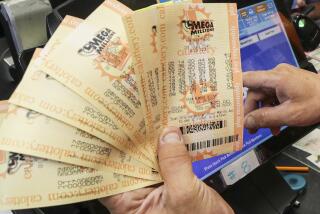Oregon Starts Its Lottery With Flair--and on Time
PORTLAND — Oregon kicked off its state lottery Thursday with Hollywood-style flamboyance and a bit of imported controversy from California, where implementation of the lottery is far behind schedule.
As a giant inflated King Kong clung to the side of a building in downtown Portland to promote the opening of the lottery, California Assemblyman Richard Floyd (D-Hawthorne) groused to reporters that Oregon was able to begin its lottery on time, while officials in his home state have already gone a month over the March 21 start-up deadline set by the lottery initiative.
Meanwhile, a controversial “briefing book” containing detailed recommendations for starting California’s lottery on schedule was released by state officials, who had kept it under wraps since last Nov. 6. They claimed it was “privileged” correspondence to Gov. George Deukmejian and exempt from the state Public Records Act.
View of Critics
Critics of Deukmejian’s handling of the lottery implementation say the briefing book recommendations would have allowed him to, as one official put it, “hit the ground running” in setting up the lottery, as was done in Oregon.
Oregon Gov. Victor Atiyeh, like Deukmejian, opposed establishment of a state lottery, but when Oregon voters approved a lottery initiative last fall, Atiyeh immediately put Robert Smith, one of the state’s highest-ranking administrators, in charge of setting it up.
Still, Atiyeh refused an invitation to take part in Thursday’s jubilant lottery kickoff day. A spokesman said an appearance by the governor in such a celebration would lack “credibility” because Atiyeh remains a lottery opponent.
Thousands of people, many of them workers on lunch breaks, jammed a downtown Portland park and gazed at the 84-foot-tall inflatable King Kong clutching a giant replica of an Oregon lottery ticket in one hand and a bunch of balloons in the other.
King Kong is supposed to symbolize renewed strength for Oregon’s troubled economy. Lottery proceeds in the state will go toward economic development.
At about 1 p.m., Lottery Commission Chairman Debbs Potts shouted, “Let the games begin.”
King Kong gave a mighty roar provided by the sound track of a Godzilla movie and 5,000 balloons carrying free lottery tickets were released from the balcony of the Portland Building.
Assemblyman Floyd, saying, “I’m not a party crasher,” flew back to California before the ceremony without buying a lottery ticket, one of his avowed purposes for taking what he described as a fact-finding mission, which included interviews with cab drivers and merchants.
Campaign Gift
Floyd, a persistent critic of the governor’s handling of the lottery, said his chartered plane ride to Portland was provided by the Operating Engineers Union Local 12 in Los Angeles and is considered a campaign contribution. He said his $140 penthouse hotel room in Portland was paid for with campaign funds.
The 83-page briefing book that was made public in Sacramento was put together last fall by a 37-member task force working under Steven A. Merksamer, the governor’s chief of staff, according to Larry Thomas, Deukmejian’s press secretary.
Nearly three months after The Times requested the document, Howard E. Varner, interim lottery director, released the report late Wednesday but minimized its importance.
“I have read it once,” Varner said. “I’ve never used it. I don’t know of any other commissioner that used it. . . . I don’t intend to even look at it again.”
However, at least some of the task force members, representing a dozen state departments, believe that the document could have been used as a guide to begin the lottery by the March 21 deadline set by the initiative approved by voters last November.
“It was intended to be a briefing book for the governor and the commission,” said Terry Frost, senior consultant to the Senate Committee on Governmental Organization and a member of the task force.
“When and if it (the lottery initiative) passed,” Frost said, “it (the briefing book) was to be used by the governor to hit the ground running.”
The book was turned over to the governor as soon as the lottery initiative passed Nov. 6, but “nothing substantive” was done with the recommendations, according to Thomas, Deukmejian’s press secretary.
Cart Before Horse
“The governor felt that to begin organizing the lottery before having in place the commission and the director would be putting the cart before the horse,” Thomas said.
The briefing book remained in the governor’s office until it was turned over to the lottery commissioners, who were appointed on Jan. 29, six weeks past the deadline for the appointments set by the lottery initiative.
“Once the the commission was appointed, we transmitted the document to the commission for its consideration,” Thomas said.
The briefing book makes recommendations on dozens of issues related to the implementation of the lottery, including suggestions on staffing, leasing facilities, contracting with retailers and whether to begin the lottery with an instant “scratch-off” game or a computerized “on-line” numbers game.
The briefing book recommends beginning with an instant game, a conclusion that the Lottery Commission also reached this month.
“It would not seem inappropriate for instant games to be implemented by March, 1985, as required by the initiative . . .,” wrote key task force member Roger D. Kluth.
Nine-Week Job
Kluth, a budget analyst with the Department of Finance, worked full time for nine weeks on the briefing book and was in charge of organizing the various recommendations.
He is currently on loan to the Lottery Commission and reluctant to discuss the briefing book.
“I was told this morning that if there were any phone calls about the briefing book, they were to be directed to Howard (Varner) or John Schade (lottery public information officer),” he said.
More to Read
Sign up for Essential California
The most important California stories and recommendations in your inbox every morning.
You may occasionally receive promotional content from the Los Angeles Times.










